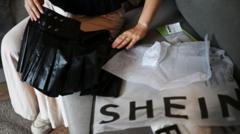The EU demands Shein address the issues within a month or face penalties, highlighting misleading discounts and worker treatment concerns.
Shein Faces EU Scrutiny Over Misleading Practices and Fake Discounts

Shein Faces EU Scrutiny Over Misleading Practices and Fake Discounts
The European Union accuses Shein of violating consumer law with deceptive marketing tactics.
In a recent statement, the European Union (EU) has taken a firm stance against Shein, the Chinese fast-fashion giant, alleging that the company has engaged in misleading practices that contravene EU law. The EU has set a one-month deadline for Shein to respond to the findings or face possible fines based on its sales figures across member countries.
Michael McGrath, the EU's justice commissioner, stated, "It’s now for Shein to step up, respect the rules, and align its practices with EU consumer standards." Meanwhile, a Shein representative assured that "our priority remains ensuring that European consumers can have a safe, reliable, and enjoyable online shopping experience."
The ongoing investigation, spearheaded by the EU's consumer rights enforcer, uncovered a myriad of problematic practices on the Shein platform. These ranged from misleading product information and deceptive labels to dubious sustainability claims and obscured contact details. The inquiry also highlighted instances where Shein appeared to offer discounts that were not reflective of actual prior prices, thereby pressuring consumers with false deadlines to hasten purchases.
Moreover, the EU insisted that Shein should present its product reviews and ratings transparently to avoid misleading consumers. "All companies engaging with EU consumers must adhere to our regulations. Today's action is a testament to our commitment to holding e-commerce platforms accountable, irrespective of their origins," asserted McGrath.
In response, Shein indicated that it has been "working constructively with national consumer authorities and the EU Commission" to demonstrate its dedication to meeting EU laws and regulations. The company confirmed its intention to continue collaborating to resolve any raised concerns.
This is not the first time Shein has found itself at the center of controversy. Previous reports uncovered that some employees at Shein were logging extensive hours—up to 75 a week—in contravention of Chinese labor laws. In January, UK MPs scrutinized the company for its alleged lack of transparency about its cotton sourcing practices, criticizing Shein for its "willful ignorance" after company representatives deflected questions on the topic.
In response to criticisms regarding worker conditions, Shein emphasized its commitment to ensuring fair treatment within its supply chain, asserting that it is investing millions to enhance compliance and governance. "We strive to maintain the highest standards for employee wages and require all supply chain partners to comply with our code of conduct," the company stated.
The unfolding situation highlights both the challenges of global e-commerce and the importance of consumer protection regulations, particularly as fast-fashion companies continue to attract criticism for their operational practices.



















